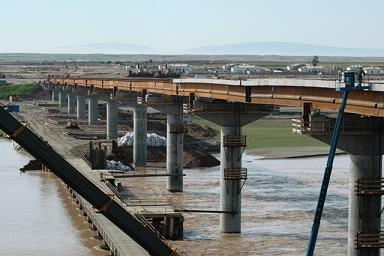June 04, 2007
THAT'S AN EXPENSIVE FRIENDSHIP
My very first blog post was actually an email to Steven den Beste about a lecture I overheard at our on-post college. The professor was spending an awful lot of time bashing the US instead of teaching the subject matter. One of the things I overheard was:
he was lecturing about how, despite what any sources say to the contrary, the American government does not give any humanitarian aid to foreign nations. He said that all American aid comes with strings attached, unlike aid from other countries like Sweden, Switzerland, and Germany. He said that the US does not donate any money in the world for purely humanitarian causes. I couldn't help but be shocked by this statement, considering that he was lecturing to 16 American soldiers and family members. I thought it was rather gutsy of him to make such statements.
Four years later, this statement doesn't bother me as much as it did that day. I have come to understand that aid without strings is pretty stupid, and there's no reason to fault our country for wanting something in return for our help. There's absolutely nothing wrong with that. By all means, string away! I think we could use more strings attached to the things we do (both at home and abroad).
However, I still think we give a heckuva lot of aid out that gets us very little in return. This is a perfect example.

That's a picture of construction being done on a bridge between Afghanistan and Tajikistan.
By summer 2007, a U.S. Army Corps of Engineers team hopes to open a $43 million, more than 2,200-foot steel-span bridge that will link the two sides.
The bridge — which will span the Oxus River, famously crossed by Alexander the Great during his conquests — will provide a valuable trade route straight from Tajikistan to the ports of Pakistan, allowing overland movement of essential goods and hopefully, economic development in Afghanistan, Tajikistan and other Central Asian nations that avail themselves of the trade route.
...
Currently, the only way to cross the river is via a ferry that costs $15 per person, a stiff price for Afghans, whose average annual income is $800.Project staff could not provide figures as to how much each side — Afghan or Tajik — would benefit economically from the bridge. But both sides of the bank already appear to be steeling themselves for a boom — new hotels have popped up on either side and residents and government officials from both nations say they’re optimistic.
...
Walls, who in addition to serving as project manager is also a resident engineer and the contracting officer’s representative, said he also hopes the completed project will send a message to those who use it.“The people of Afghanistan and the people of Tajikistan see we’re building something constructive,” he said. “It shows America as doing something to help the country.”
The United States gets absolutely nothing of economic value from Tajikistan. They don't have oil. Their main export is cotton, grown at the expense of their environment and the Aral Sea because of stupid Soviet planning. And Afghanistan means nothing to us save the terrorism aspect.
There's only one conclusion: We spent $43 million dollars to win the hearts and minds.
Seriously, I'd love for this professor to explain to me the selfish reasons behind fronting the money for this bridge. Halliburton didn't make any profit, and there's not a drop of oil crossing the bridge. We simply paid $43 million dollars so people in that region would like us and maybe think twice before joining al Qaeda. That's it.
The next time someone tells you that the US never does anything for humanitarian reasons, remember this bridge. Nothing in the world is a free lunch -- not even in Sweden, despite what this prof says -- but building a $43 million bridge just so people in the area will like you comes pretty damned close.
Posted by Sarah at June 4, 2007 11:53 AM | TrackBackThat bridge (and non-hostile Tajiks on the other side of it) could be quite useful if we need to re-supply our forces in Afghanistan without going through Pakistan (or Iran). Or, God forbid, extricate them from an overwhelming offensive from one or both of those countries.
Posted by: Glenmore at June 4, 2007 11:37 PM